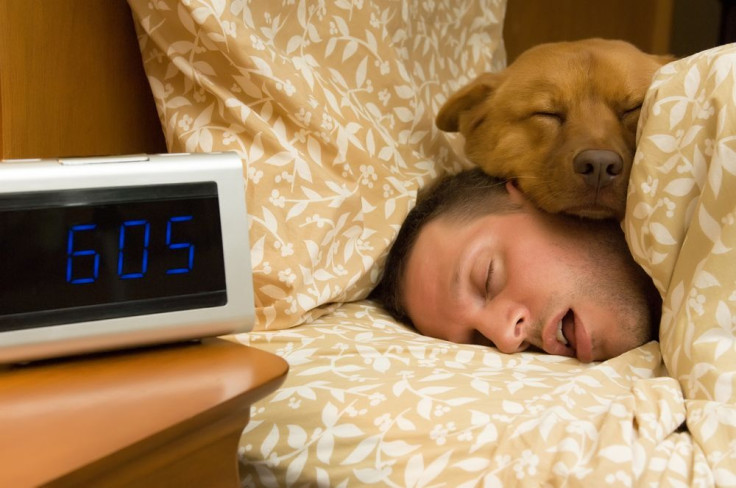Cures For Snoring: Mouth And Tongue Exercises That'll Help You Stop Snoring For Better Sleep

When we go to sleep at night, we lie in bed with the intent to fall into a deep slumber until the morning. However, if we’re snorers, this can mean another sleepless night for our bed partners — until now. According to a recent study published in the journal CHEST, practicing oropharyngeal (mouth and tongue) exercises can significantly reduce snoring frequency for patients with primary snoring or mild obstructive sleep apnea (OSA).
Snoring affects approximately 90 million American adults and 37 million on a regular basis across all ages and both genders, says the National Sleep Foundation. The noisy deep breathing during sleep occurs when the muscles of the throat relax, the tongue falls backward, and the throat becomes narrow and floppy. This is when the walls of the throat start to vibrate, specifically when you breathe in and occasionally when you breathe out. These vibrations are what produce the snoring sound.
This can become a more serious problem as people age, disrupting not only your own sleep, but of your bed-partner. These bouts of interrupted sleep contribute to tiredness and sleepiness throughout the day, despite the many snoring aids on the market, including sedatives, or other remedies like lying flat on the back to sleep, weight loss, and even dental sleep devices.
"Past studies have focused on self-reporting questionnaires. New forms of treatment for snoring focusing on objective measures were needed. We tested the effectiveness of oropharyngeal exercises to reduce snoring," said Dr. Geraldo Lorenzi-Filho, study author, in the press release.
In an effort to study the effects of oropharyngeal exercises on primary snoring and mild OSA, Lorenzi-Filho and his colleagues recruited about 40 patients with a primary complaint of snoring and diagnosis of primary snoring or mild-to-moderate OSA. The patients were evaluated at the beginning and end of the study by sleep questionnaires and full polysomnography with objective measurements of snoring.
The researchers required the therapy group to do four exercises including:
· Pushing the tip of the tongue against the roof of the mouth and sliding the tongue backward
· Sucking the tongue upward against the roof of the mouth, and pressing the entire tongue against the roof of the mouth
· Forcing the back of the tongue against the floor of the mouth while keeping the tip of the tongue in contact with the bottom, front teeth
· And elevating the back of the roof of the mouth and uvula while saying the vowel "A"

The findings revealed these exercises are a promising, noninvasive treatment for large populations suffering from snoring, including their bed partners, which are normally omitted from research and treatment. Mouth and tongue exercises significantly reduce the rate of snoring by 36 percent and the total power of snoring by 59 percent. "[T]he exercises significantly reduced snoring in our study group,” said Lorenzi-Filhi about the results.
A similar 2006 study published in BMJ found playing didgeridoo — a wood wind instrument from Australia that is made from the trunk of a tree and hallowed out by termites — helped reduce snoring and the daytime sleepiness associated with OSA. The participants learned the art of circular breathing, which allows the wind instrumentalist to maintain an unbroken sound for long periods of time through nose inhalation while keeping airflow through the instrument, and using the cheeks as bellows. After practicing at home at least 20 minutes for a minimum of five days a week, the researchers saw improvement in patients with moderate OSA and snoring in a four-month trial period.
These natural sleep aids can help keep snoring at bay and eliminate the dependency on over-the-counter medications or expensive OSA gear.
They can put your snores to sleep for you and your bed partner’s sake.
Sources: Alencar AM, Drager LF, Genta PR et al. Effects of oropharyngeal exercises on snoring: a randomized trial. CHEST. 2015.
Braendli O, Heitz M, Lo Cascio C et al. Didgeridoo playing as alternative treatment for obstructive sleep apnea syndrome: randomized controlled trial. BMJ. 2006.
Published by Medicaldaily.com



























